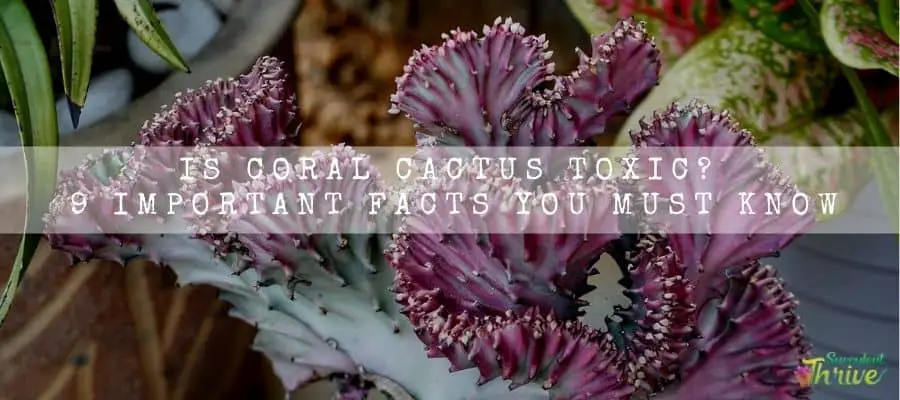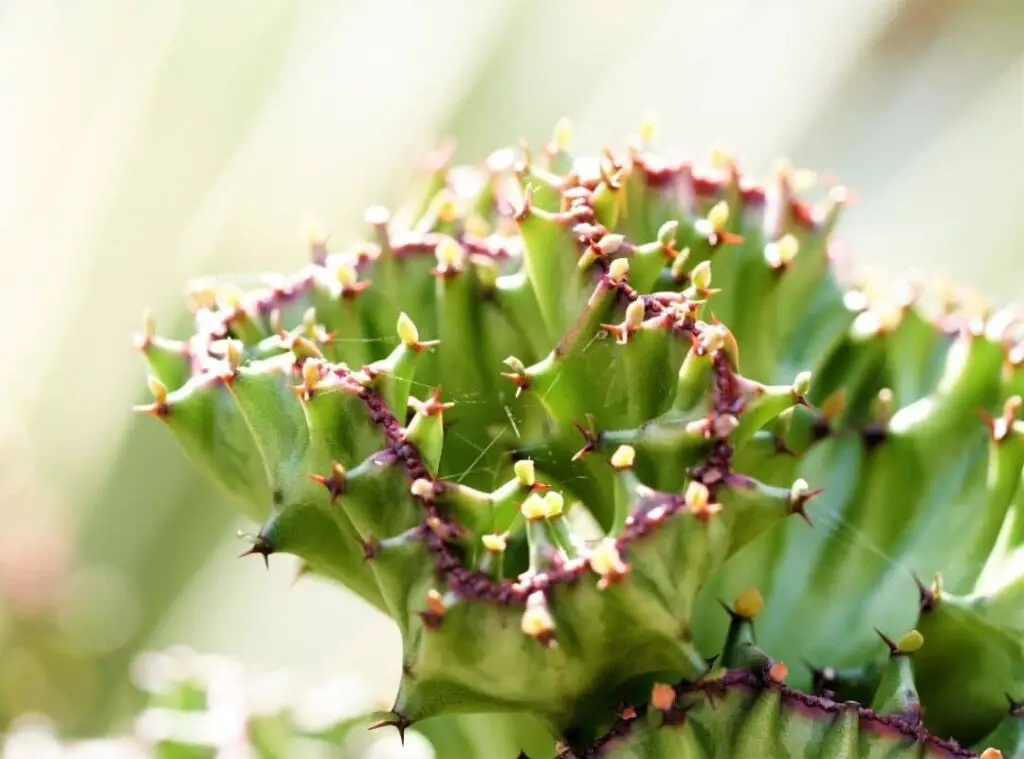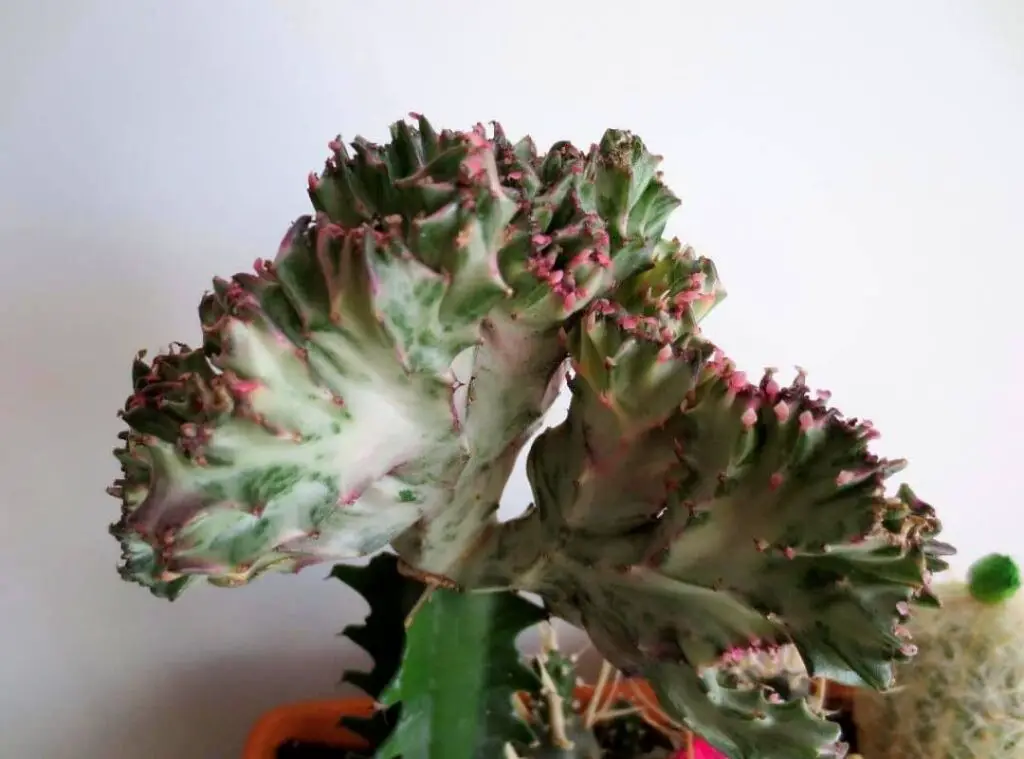If I ask you “is coral cactus toxic?” Do you know the answer?. Let me help you there. In this article I explain everything you need to know about coral cactus toxicity. Keep read

Is coral cactus toxic?
Coral cactus is toxic. In fact, coral cactus has a latex or sap which could be dangerous for humans as well as for pets.
To elaborate further, their sap is thick and a white. It could in fact cause irritations in the skin. It could be dangerous to the level that it could even create temporary blindness.
If you ingest it, you will end up having nausea or vomiting.
What is coral cactus?
To briefly touch on the background of the coral cactus, it is not the typical cactus which you may come across.
Instead, it is a graft cactus of two cacti. It could be most probably Euphorbia neriifolia which will be used for the base plant and a different plant as the grafted part.
The most used grafted cactus is Euphorbia lactea. When you graft these two together, the whole set up of the plant tends to look like coral.
Some of the common names which you could use are candelabra plant, crested candelabra plant, crested elkhorn etc.
You could have white, red, green or purple based on the top crest plant. You could spot sharp spines covering the whole graft as well.
Their flowering is not that attractive when compared to other succulents and the cactus. Further chances are that they may not flower at all too.
Which part of the plant is toxic?
The entire coral cactus is poisonous.
In fact, they consist of a sap which is called latex and that is dangerous. You should not ingest any part of the plant at any given time.
Why is coral cactus toxic?
Coral cactus contains a poisonous sap which is called latex and it is harmful for both humans as well as for animals.
Hence, I recommend you to be mindful to protect yourself first and then start interacting with the plants.
This sap is white and thick and once you end up touching its bare skin, it could create irritations in the skin.
If by any chance the toxin releases to your eye it could make you temporarily blind. Further if you ingest it, it could create symptoms such as vomiting and nausea.
Hence keep in mind that you need to keep the plants away from the kids and with your pets as well.
I recommend wearing protective gear before starting to interact with the plants. Their sap could be so dangerous as it could be toxic when it is dry too.
Animal affected by coral cactus poison
Coral cactus is toxic for dogs, horses, cats and for humans as well.

Is coral cactus toxic to touch?
Coral cactus is not toxic to touch but it could produce the poisonous sap when it is damaged (or cut). As such if you get in contact with the poisonous toxin it could lead to irritations in the skin.
Furthermore, if you end up eating parts of the plant, it could also be dangerous for you and cause symptoms such as vomiting and nausea.
As such, the best is to place the plant in a place where anybody cannot reach it
However, you may have to start interacting with the plant for its maintenance and in that circumstance, I recommend you protect yourself with protective gears and then start dealing with it.
Symptoms of coral cactus poisoning
Their latex could contribute to severe symptoms such as skin irritations, eye irritations etc.
Avoid consuming the parts of the plant at any given time. it could create temporary blindness as well.
In addition to that, you will see red eyes, burning feelings in the eyes, itching, swollen skin etc.
How to Treat coral cactus poisoning
First aid
As aforesaid they could create temporary blindness and it is very important that you treat them immediately.
First and foremost, you need to wash the affected places for about 15-20 minutes. However, keep in mind that the wash water does not get in contact with the unaffected areas of your body.
If the toxins touch the skin, it could create burnings, itching and irritation in the skin etc. They would ultimately turn into blisters as well.
If you ever come across such a situation, you need to wash the areas with soap and water.
Do not take a warm water bath as if you do so, it could spread the sap all over your body and make things even worse.
If your pet has consumed any part of the plant, first check your pet’s mouth whether they have any leftovers in the plant.
If you spot any, you should immitaley take them out. After that you should go visit a veterinarian immediately.
At hospital
Consider that your pet has consumed a part of the plant, then your veterinarian could use some solution to wash their eyes.
That will help to reduce the pain. However, it is very unlikely that an oral medication will work.
Having said that , if your pets keep vomiting, it will lead to dehydration. Docs will give saline or other methods to prevent dehydration.

Is coral cactus toxic to humans?
The latex of the coral cactus is toxic for humans. It could create irritations in skin like dermatitis.
It could further result in painful inflammations as well. if you interact with the plant bear skin, it could create blisters.
Further if the toxin releases to your eye, it could make you temporarily blind too. On the other hand, if you ingest the parts of the plant, it will also create allergy reactions such as nausea or vomiting.
Precautions you can take
It is important that you avoid your kids as well as your pets interacting with the coral cactus.
I recommend placing the plants in a place where your kids or the pets cannot reach. Further you need to avoid growing them in your yard.
If you still wish to grow them in your yard, you could consider placing physical barriers so that nobody could reach there. Maybe you could place a fence or something like that.
In addition to that, whenever you are dealing with the plant or its maintenance purposes, you need to wear thick gloves, eye protection, etc.
Moreover, I recommend that you cover your whole body while wearing long sleeves and long pants so that none of the body area is exposed to the toxins.
However the cloth material should also be a heavy one which could deflect the sap in case it reaches your skin.
When you finish interacting with the plant, you should remove all your protective gears without leaving them exposed to kids or to any pets.
Next wash your hands properly and I recommend having a full bath.
Read Next : Is Panda Plant Toxic? | 10 Shocking Facts You Should Know | Is Pencil Cactus Toxic? | 10 Interesting Facts About Toxic Pencil Cactus | Are snake plants toxic ? | 11 Useful facts About Toxic Snake Plant |
